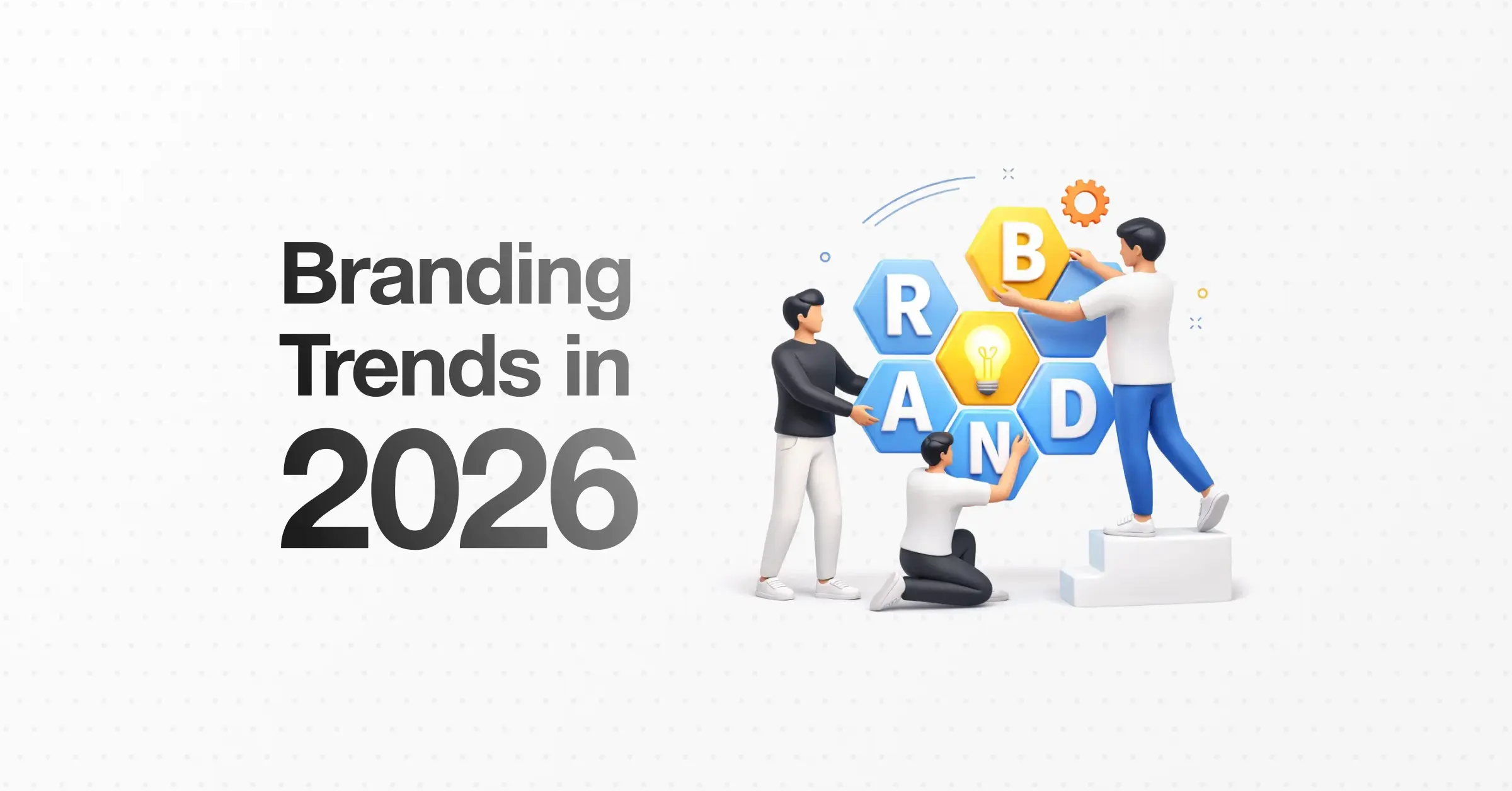Branding
7 Reasons Highlighting the Importance of Branding for Startups
January 1, 2026
September 24, 2024

A strong brand gives your startup clarity, focus, and direction. It defines what you stand for, how you sound, and why customers should care.
Without it, even good products struggle to earn trust or stand out.
Branding is strategy before design, it shapes perception, drives recognition, and builds long-term value.
Here’s what defines an effective startup brand and how to build one that actually influences growth.
First, Let’s Clarify What We Mean by ‘Startup Branding’
Branding is far more than logos, colours, or taglines. It's the complete identity of your company.
It shapes how your customers differentiate you, think of you, and talk about your brand when you're not around.
Essentially, your brand is people's emotional connection with your business.
A strong brand resonates with customers by clearly communicating your company's values and mission.
.webp)
"Your brand is the single most crucial investment you can make in your business." -Steve Forbes, Editor-in-Chief, Forbes Magazine.
Startup branding is the tactical strategy behind building a unique, effective identity for a newly established business.
For a startup, creating a strong brand isn't just an option—it's a necessity.
Branding for Startups that resonates with your audience creates trust and positions your startup as a solution to their problems.
For startups, Branding includes:
- A clear mission and vision: What do you stand for? What problem do you solve?
- Visual elements: Logos, colour schemes, and design aesthetics.
- Tone and voice: How you communicate with your audience.
Your brand isn't just what you say about your company—it's how people feel about you.
Why Branding Matters for Startups?
Branding is more than just a logo, it’s your startup’s identity. Strong branding answers key questions like:
- Does your startup have a distinct personality?
- How does your target audience perceive your company?
- What’s the quality of your products and services?
- What is your position in the marketplace?
- Why is your startup the right choice for your customer?
- What does the future of your startup look like?
Branding plays an important role in the success of startups, especially in today’s highly competitive market.
Here’s the 7 Key Reasons Why Branding is Essential for Startup Success
1. Startup Branding Helps to Build Trust and Credibility
Trust is the foundation of any productive business, and branding plays a vital role in building it. People are more likely to connect with a company they recognize and trust. When your startup branding is consistent and professional, it reassures customers that your business is legitimate and credible.
Example:
.webp)
When Tesla entered the auto-motive industry, it didn’t get the trust that brands like Ford or Toyota enjoyed. But through consistent branding around creation, sustainability, and luxury, it built credibility. Today, Tesla is seen as the leader in electric vehicles.
2. Branding for Startup Differentiate You from Competitors
.webp)
A unique branding strategy gives your startup brand a unique identity, allowing it stand out in a crowded market.
Your competitors might offer similar products or services, but branding allows you to communicate what makes your startup different.
Example:
.webp)
Think of Slack in the world of communication tools. While there were other options available, Slack’s fun and approachable branding made it the tool of choice for businesses worldwide.
The brand set itself as not just another messaging platform but one that made work communication enjoyable and efficient.
3. Startup Brand Create Recognition and Recall at Ease
.webp)
Branding helps your startup become memorable. Consistent branding across all touchpoints, your website, social media, packaging, and ads, creates recognition and recall. The more customers see your brand, the more likely they will remember and choose it when buying.
Example:
.webp)
Apple has established a strong brand image over the years. They sell not just tech products but innovation, creativity, and simplicity.
Every interaction with the brand—whether using an iPhone, visiting its website, or walking into a store—feels like part of the same story.
This consistency is what makes Branding so powerful for any startup.
4. Attracting and Retaining Customers
.webp)
A strong brand connects emotionally with customers, building loyalty and encouraging repeat business.
Branding isn’t just about acquiring new customers; it’s about creating a connection that keeps them coming back.
Example:
.webp)
Amazon’s commitment to customer satisfaction is reflected in its branding.
From fast delivery to easy returns, Amazon’s brand is built on convenience and reliability.
This has helped Amazon develop a loyal customer base that keeps returning because they trust the brand’s commitment to service.
5. Unique Brand Boost Your Marketing Efforts
.webp)
Effective branding makes marketing easier. A strong brand creates a clear and consistent message, which you can leverage across all marketing channels.
When customers already recognize and trust your startup brand, marketing campaigns become more effective.
Example:
.webp)
Nike’s marketing campaigns are synonymous with their "Just Do It" slogan.
This consistent message has made Nike one of the most recognizable brands in the world.
Their brand is built around themes of motivation, empowerment, and athleticism, making their marketing efforts resonate with a wide audience.
6. Attract Investors and Partners to Ignite ROI
.webp)
Branding doesn’t just attract customers; it also catches the attention of investors and partners.
A strong brand shows that your startup has a clear direction and long-term potential.
Thus making it more attractive to those who want to invest in or collaborate with you.
Branding adds measurable value to your startup. Investors and customers also see more value in branding a startup company.
It also provides you pfofitable result when negotiating business deals, securing investments, or planning an exit strategy.
Example:
.webp)
Airbnb’s brand is built around the idea of "belonging anywhere."
Their commitment to creating a global community of hosts and guests made them stand out to investors.
The clarity and strength of their branding helped secure early-stage investments that contributed to their rapid growth.
7. Branding a Startup Company Helps to Gain Customer Loyalty
.webp)
Customer loyalty is the root to sustainable growth, and branding heightens it.
When customers feel emotionally connected with your brand, they’re likelier to remain loyal and recommend your startup to others.
This loyalty turns customers into brand advocates.
Example:
.webp)
Starbucks is more than just a coffee shop. Their brand promises a warm, welcoming environment where people can work, relax, or meet friends.
This emotional connection has built a community of loyal customers who don’t just buy coffee, they buy the Starbucks experience.
Common Mistakes Startups Make with Branding
We’ve all been there. Here’s what not to do:
- Skipping branding altogether: You might think it saves money, but it costs you big time in the long run.
- Focusing only on visuals: A pretty logo means nothing without a strong message behind it.
- Being inconsistent: If your tone, visuals, or messaging change from one platform to another, you’re confusing your audience.
- Ignoring evolution: As your startup grows, your brand should grow with it. Don’t be afraid to adapt.
How Do We Go About Branding for a Startup?
At Ofspace, we don’t just create brands—we craft identities that make startups impossible to ignore. Here’s how we transform your vision into a magnetic brand, step by step:
1. Define Your Brand Identity
Every great brand starts with a solid foundation. We dig deep to uncover your startup’s mission, values, and unique story.
This is where your personality comes to life, because a strong identity is what sets you apart from the noise.
2. Know Your Audience Inside-Out
Let’s face it: You can’t connect with your audience if you don’t know who they are.
That’s why we dive into audience analysis, understanding their desires, pain points, and what makes them tick.
With this insight, we craft a brand message that feels like it was made just for them.
3. Craft a Visual Identity That Turns Heads
Logos, colors, fonts—these aren’t just pretty designs; they’re the face of your brand.
At Ofspace, we ensure every visual element reflects your story, screams personality, and makes your startup instantly recognizable.
Plus, we keep it consistent across every touchpoint, because consistency = trust.
4. Build an Online Presence That Resonates
Your digital presence is your storefront to the world. We build you a sleek, user-friendly website and craft a social media strategy that isn’t just about showing up—it’s about standing out.
Every post, page, and interaction reinforces your brand’s vibe, ensuring your audience keeps coming back.
5. Create Emotional Connections Through Content
Content isn’t just about filling up space—it’s about telling your story, solving problems, and creating real connections.
From blogs to videos, we create content that resonates, positions your startup as an industry leader, and turns visitors into raving fans.
6. Build a Community Around Your Brand
A strong brand doesn’t just attract customers; it creates a tribe. At Ofspace, we help you build a community that feels heard, valued, and connected.
Loyal fans don’t just buy—they share, advocate, and grow your brand for you.
FAQs About Startup Branding
What’s the difference between branding and marketing?
Branding defines who you are as a company, while marketing is how you promote your brand and products to your audience.
Why is branding important for startups?
Branding is crucial because it creates an identity that connects with your audience.
It sets your business apart from competitors and builds trust and credibility with potential customers.
Can startups create a brand on a limited budget?
Yes, even with a limited budget, startups can create a strong brand by focusing on their mission, consistent messaging, and visual identity.
Contact Ofspace, a startup branding agency, to get a flexible pricing plan.
Get the best branding services for startups with unlimited requests, revisions, and limitless subscriptions.
What are the key elements of a strong startup brand?
Key elements include a clear mission, consistent visual identity, unique voice, and emotional resonance with your audience.
Should startups use professional branding services?
While startups can manage branding in-house, professional services ensure a cohesive, professional brand that can accelerate growth.
How does branding influence investor decisions?
A strong, clear brand demonstrates credibility and long-term potential, making your startup more engaging to investors.
What are the three main benefits of branding for new businesses?
Firstly, branding increases company recognition. Secondly, it builds consumer trust through consistent messaging and quality assurance.
Lastly, it supports marketing efforts by enhancing the value and appeal of your offerings.
How does brand strategy impact a startup's market positioning?
A robust brand strategy clarifies your market position and differentiates you from competitors.
It guides marketing and business decisions, aligning them with your brand's long-term goals.
Conclusion
Building a strong brand is one of the best investments a startup can make.
A well-defined startup brand establishes trust, sets you apart from the competition, and lays the foundation for long-term success.
Whether it’s creating emotional connections with customers, supporting your marketing efforts, or attracting investors, branding for startups is a crucial part of any growth strategy.
Need help developing your startup's brand?
Get the branding services for startups and learn how we can create a powerful brand identity for you.








